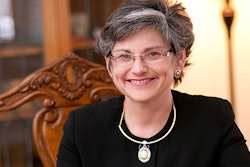WASHINGTON — With a sizable list of partner organizations, the Excelencia in Education advocacy group embarked Wednesday upon what organization leaders described as a “quest” for solutions and policy changes that will help improve college completion rates among United States’ growing Latino population over the next decade.
Like many higher education initiatives, this one — formally known as Ensuring America’s Future by Increasing Latino College Completion — seeks to align itself with the Obama Administration’s goal of making the United States the most college-educated nation in the world by 2020.
What is distinct about the initiative is that it claims that goal cannot be reached unless there is a concerted and deliberate effort to identify and expand the use of tactics and strategies that have been proven to work with getting more Latino youths to and through college.
Sarita Brown, president of Excelencia in Education, likened the initiative to a capital campaign.
“But our resource is people,” Brown said Wednesday at the National Press Club in Washington, D.C. “This is a human-capital campaign.”
Giselle Fernandez, a former journalist who now serves as spokeswoman for the campaign, said the education and economic prosperity of Latinos is tied to the education and economic prosperity of the nation.
“Because if we have this exploding population that’s uneducated, unskilled and unemployed, that spells really bad news for our overall economy,” Fernandez said. “It’s not a brown problem. It’s a green economic problem that faces each and every one of us.”
To help set the stage for the initiative, Excelencia released two reports in tandem that deal with Latino college-completion rates.
The first was Ensuring America’s Future: Benchmarking Latino College Completion to Meet National Goals: 2010 to 2020.
Among other things, that in the 2007-2008 school year, only 21.7 of all 18- to 29-year-old Latinos had earned associate or bachelor’s degrees, versus 49.1 percent for whites a gap of roughly 27 percent, according to the report.
The report also states that 5.5 million Latinos will have to earn college degrees between now and 2020 in order for the United States to reach the Obama Administration’s national degree-completion goal.
Based on the report, that means 3.3 million more Latinos than are projected to earn degrees between now and then will have to complete college.
“When we saw that we need to make sure we have 5.5 million degrees for Latinos to help meet our goal, we thought that was a really a solid number that we could talk about,” said Deborah Santiago, vice president of Excelencia. “This is where we can keep our attention.”
The other report is titled Ensuring America’s Future: Federal Policy and Latino College Completion. This report examines how existing programs at the federal level impact or influence Latino completion rates. The report notes, for instance, that Hispanics represent 19 percent of TRIO students.
Tom Dawson, senior policy officer at the Bill and Melinda Gates Foundation, one of the funders of the Excelencia initiative, said the initiative is in line with a Gates initiative meant to “double the number” of young people who earn a postsecondary degree of certificate with marketplace value by age 26.
He said it will be important to focus on addressing academic preparedness for Latino youths, developing ways to make sure that Latino youths maximize financial aid without borrowing unnecessarily or unwisely, and identifying academic programs that lead to payoffs upon graduation.
Travis Reindl, program director for the Postsecondary Education Education Division of the National Governors Association, one of the partner organizations in the Excelencia initiative, said it will be important to search for policy solutions that integrate rather than separate Latino students in higher education.
“A lasting economic recovery cannot be achieved without an educated workforce,” Reindl said. “We cannot pilot project our way out of this.”
Reindl also stated that the issue of Latino college completion is an issue that effects the entire nation — not just states with large Latino populations.
“This is not a California, Texas or Florida issue,” Reindl said. “This is an American issue that touches on all 50 states in some shape or form.”
Citing statistics that show large amounts of financial aid that go to students who don’t need it, Cynthia Rivera Weissblum, president of the Edwin Gould Foundation, another partner organization, said there is a need to examine financial aid policy to make sure the neediest students get help first.
“We must increase Pell Grants for those in financial need and re-calibrate financial aid to ensure that those who don’t need it don’t get it,” Rivera Weissblum said.
Asked for more specifics on policies that seem ripe for change and what kind of changes Excelencia has in mind for its initiative, Brown said it’s still early in the initiative’s existence and that more a more detailed “policy roadmap” would be made available in March.



















